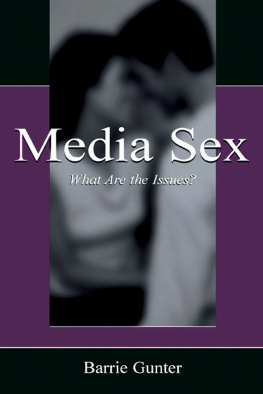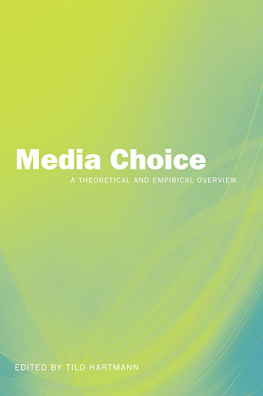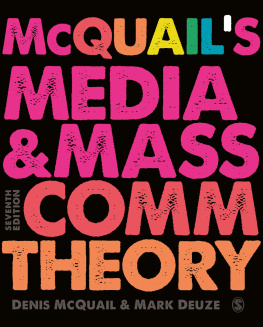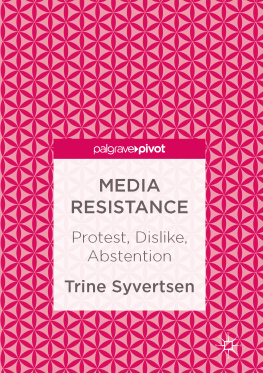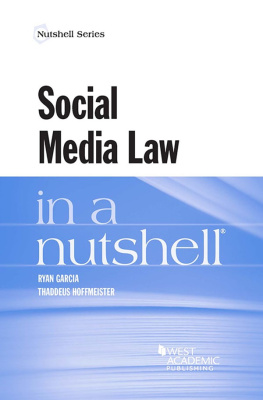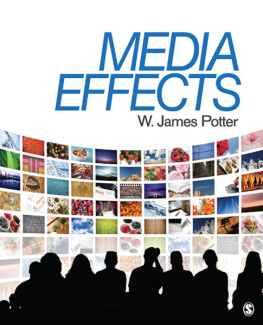Media Sex
What Are the Issues?
LEAs Communication Series
Jennings Bryant/Dolf Zillmann, General Editors
Selected titles in Mass Communication (Alan M. Rubin, Advisory Editor) include:
Alexander/Owers/Carveth Media Economics: Theory and Practice, Second Edition
Bryant/Bryant Television and the American Family, Second Edition
Compaine/Gomery Who Owns the Media? Competition and Concentration in the Mass Media Industry, Third Edition
Harris A Cognitive Psychology of Mass Communication, Third Edition
Moore Mass Communication Law and Ethics, Second Edition
Perse Media Effects and Society
Sohn/Wicks/Lacy/Sylvie Media Management: A Casebook Approach, Second Edition
Van Evra Television and Child Development, Second Edition
Zillmann/Vorderer Media Entertainment: The Psychology of Its Appeal
Media Sex
What Are the Issues?
Barrie Gunter
University of Sheffield
First published 2002 by Lawrence Erlbaum Associates, Publishers
Published 2014 by Routledge
2 Park Square, Milton Park, Abingdon, Oxon OX14 4RN
711 Third Avenue, New York, NY 10017, USA
Routledge is an imprint of the Taylor & Francis, an informa business
Copyright 2002 by Lawrence Erlbaum Associates, Inc.
All rights reserved. No part of this book may be reproduced in any form, by photostat, microform, retrieval system, or any other means, without prior written permission of the publisher.
Cover design by Kathryn Houghtaling Lacey
Library of Congress Cataloging-in-Publication Data
Gunter, Barrie
Media sex : what are the issues? / Barrie Gunter.
p. cm.
Includes bibliographical references and index.
ISBN 0-8058-3722-1 (cloth) ISBN 0-8058-4010-9(pbk.)
1. Sex in mass media. I. Title.
P96,/S45 G86 2001
306.7dc21
00-068136
ISBN 978-0-805-83722-3 (hbk)
Contents
Public debate about sex in the media has become increasingly vociferous despite the liberal attitudes that prevail within many Western societies at the beginning of the 21st century. Concern about media sex stems, in part, from the perception of increased prevalence and availability of explicit sexual materials produced by a burgeoning pornography industry. For some sectors of society, such material is regarded as distasteful and offensive. The products of this industry are no longer simply identified with salacious magazines, but with a vibrant video and film production business whose output is distributed not only through specialist stores, but also via subscription television channels. It is not only restricted circulation sex material that has been challenged. Conservative lobby groups and associated right-wing press have accused even the mainstream media, television in particular, of turning increasingly to the use of explicit sex in a battle for ratings.
In the United Kingdom, for example, the countrys most widely read conservative tabloid, the Daily Mail, has waged a major campaign against sex on television. Although virtually no channel has escaped criticism, the campaign has focused principally on the scheduling tactics of the new terrestrial broadcast Channel 5 that has made a point of including significant amounts of risqu content on its late-night (post-10 p.m.) line-up with naked game shows, interviews with porn stars, and exposs on the pornography industry that often include clips from explicit movies that would not normally be deemed appropriate for television. The same channel (though it has not been alone in this) has also televised late-night soft-porn films with full frontal female nudity and simulated sex scenes. Such films would previously have been found only on encrypted, subscription television channels broadcast by satellite or transmitted through cable.
Despite the negative press coverage, public opinion surveys have not supported the view of antimedia sex lobbyists that there is widespread public disquiet over these developments. The new Channel 5 in the UK has quickly established its presence, and the additional publicity it has achieved in the light of its controversial scheduling strategy has undoubtedly helped it to reach a respectable audience share, in an increasingly competitive TV marketplace, by fuelling viewers curiosity. The publics view about sex on television, however, is fairly open-minded. Subscribers to encrypted television channels have displayed liberal attitudes towards porn channels and displayed an open mind regarding the rights of people to choose for themselves their preferred forms of entertainment. Sex is not widely regarded as unacceptable, though the extent to which it is accepted depends on a range of mediating factors. These include the time of transmission, the channel of transmission, the nature of the program, the appropriateness of its utility in a program, and its treatment when it occurs. Public opinion profiles concerning media sex can also be affected by the form of questioning used in a survey. Survey respondents not uncommonly express greater concern about the possibility of harmful reactions to media sex occurring among other people than among themselves.
Weighing up this evidence, therefore, is there cause for concern about media sex? Whether or not sex on television or in the movies, or the even more explicit depictions of pornography magazines or videos, is acceptable is partly a matter of public opinion. Such opinion serves as a barometer of current social values, and these can shift over time. This is not the end of the story, however. The acceptability of media sex must also be judged according to more stringent criteria that focus on the issue of harm. Regardless of whether people like to consume media sex, or acknowledge that even if it is not something they personally enjoy, others might, there is a separate matter of how viewers might be influenced by the experience. As we will see in this book, a range of possibly harmful, social and psychological consequences of exposure to media sex have been highlighted over the years.
In liberal, democratic societies that enjoy freedom of speech, there is a tolerance for the publication of all kinds of material, regardless of their inherent popularity. The idea of censorship, for example, comes into direct conflict with the fundamental principle of a free press. In the United States, for instance, freedom of speech is one of the founding principles of the society and is a statutorily protected right. The offence that specific publications might cause to the sensibilities of certain sectors of society is not deemed to be a sufficiently powerful reason for restricting the freedom to publish. However, if a solid case can be made that a publication has harmful effects on individuals or society at large, that would present a clear and present danger, then freedom of speech protection could be repealed. The problem here is proving that such harm has occurred or is likely to.
In this book, international evidence is collated about media sex. A number of fundamental questions are asked about sex in the media. Individually, these questions are not new. However, this book represents the first attempt to examine this breadth of questions within a single volume. The book considers questions about the prevalence and prominence of sex in the media, about public opinion concerning that content, about different kinds of effects (usually harmful ones) that allegedly follow exposure to media sex, and about the use of sex as a selling device. The reported or supposed harms of media sex range from short-term effects on postviewing attitudes to sexual aggression and female sexuality or on behavioral aggression to longer term influences on social values, sexual beliefs and sexual practices. Media sex has been accused of undermining social mores, promoting sexual promiscuity, the early onset of sexual behavior and teenage pregnancy rates, and producing distorted male (and female) beliefs about female sexuality. Each of these issues is examined in separate chapters in this book.
Next page
